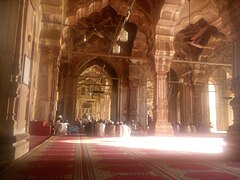Taj-ul-Masajid
History
The construction of the Taj-ul-Masajid was started by Nawab Shah Jahan Begum of Bhopal, in the newly built walled suburb of Shahjahanabad. The exact year when construction was started is unclear; Sharma estimates it to be 1871. Bhopal-based journalist and the author of Masajid-e-Bhopal (transl. The Mosques in Bhopal), Aarif Aziz states the date to be 1887.
After Shah Jahan Begum died in 1901, the mosque continued to be built by her daughter Sultan Jahan Begum, till the end of her lifetime. The structure was planned in the midst of three water bodies, namely: Munshi Hussain Talab; Noor Mahal Talab; and Motia Talab. Hamidullah Khan helped construct one gate of the mosque on the suggestions of Shah Jahan Begum.
The construction work was later on led by Islamic scholar Imran Khan Nadwi, whose brother Salman Khan Nadwi, supervised the constructions. The construction was complete by 1958 at an expenditure of 20 million Indian rupees. The entrance of the mosque was renovated with motifs from 13th century Syrian mosques donated by the Emir of Kuwait in memory of his late wife.
During the COVID-19 pandemic, the mosque was used as a vaccination center.
Architecture
The Taj-ul-Masajid largely takes inspiration from Mughal architecture. The mosque has a pink facade topped by two 18-storey high octagonal minarets with marble domes, an impressive main hallway with attractive pillars, and marble flooring resembling the likes of Jama Masjid in Delhi and the Badshahi Mosque of Lahore. It has a courtyard with a large ablution tank in the centre. It has a double-storeyed gateway with four recessed archways and nine cusped multifold openings in the main prayer hall. The massive pillars in the hall hold 27 ceilings through squinted arches of which 16 ceilings are decorated with ornate petalled designs.
The mosque also features a zenana (women's gallery), rare given that prayer from home was the norm for women at the time of the mosque's construction.
Annual congregation

Bhopal Tablighi Ijtema, an annual three-day congregation of the Tablighi Jamaat was hosted in the Taj-ul-Masajid between 1948 and 2001. It was shifted to Intkhedi. outside the city due to shortage of space.
Gallery
-
Taj-ul-Masajid gate
-
Entrance Gate of Taj-ul-Masajid
-
Taj-ul-Masajid aerial photo
-
Taj-ul-Masjid Ground
-
Taj-ul-Masajid Entrance gate
-
Madrasa in Taj-ul-Masajid
-
Carvings on wall
-
Clock showing Namaz Timing
-
Taj-ul-Masajid inside
-
Taj-ul-masajid inside
-
Taj-ul-masajid outside view
References
- ^ McCrohan, Daniel (2010). "The search for the world's smallest mosque". Lonely Planet.
- ^ "Wondrous Masajid". Deccan Herald. 16 March 2013. Retrieved 26 June 2021.
- ^ "Taj-ul-Masajid". bhopal.nic.in. Archived from the original on 28 September 2011. Retrieved 27 September 2014.
- ^ Masajid-e-Bhopal (3rd ed.). Bhopal: Iqra Publishing House. November 2003. pp. 117–118.
- ^ "Raj Bhavan MP | The Hon'ble Governor". governor.mp.gov.in. Retrieved 22 October 2021.
- ^ Mulchandani, Anil (11 December 2015). "TAJ UL MASAJID". Times Travel. Retrieved 7 April 2023.
- ^ "Historical Taj-ul-Masajid premises in Bhopal used to vaccinate inter-faith people". The Siasat Daily. 10 April 2021. Retrieved 26 June 2021.
- ^ "Taj-Ul-Masajid: Crown of the mosques, Bhopal - the largest mosque in India". Retrieved 19 September 2021.
- ^ "Magnificent, and elaborate". The Hindu. 25 September 2015. ISSN 0971-751X. Retrieved 26 June 2021.
- ^ 4to40.com (11 April 2021). "Taj-ul-Masjid, Bhopal, Madhya Pradesh". Kids Portal For Parents. Retrieved 16 July 2024.
{{cite web}}: CS1 maint: numeric names: authors list (link) - ^ "A queen's mark in Bhopal". Deccan Herald. 15 December 2018. Retrieved 22 October 2021.
- ^ "Wondrous Masajid". Deccan Herald. 16 March 2013. Retrieved 22 October 2021.
- ^ "Madhya Pradesh: Muslims pour in as Ijtema begins". Retrieved 18 September 2021.










